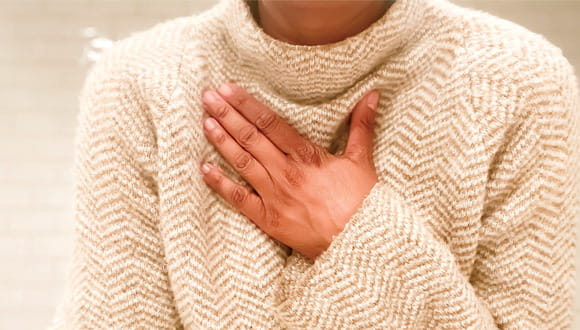Nothing quiets a room like that first 'hic' as it's released. And hiccups almost never stop at just one. What comes next is usually a series of several more — each slipping out to an impressively synchronized beat, your upper body bouncing along with each one.
Hiccups are a nuisance, to be sure. Sometimes, they're also embarrassing — appearing at the most inopportune times, such as right before you have to give that presentation you've been stressed about. (Coincidence? We'll find out.)
They typically don't last long, though, subsiding in just a few minutes. They also happen to everyone, from adults to children to babies. (And even dogs and cats!)
And while you may see them as more of a nuisance than a curious phenomenon, we've all still wondered: Why do we get hiccups?
What causes hiccups?
Between your chest and your abdomen lies a muscle that plays a vital role in breathing: Your diaphragm. As you inhale, your diaphragm contracts — pulling air into your lungs. As you exhale, it relaxes to push recycled air (which includes carbon dioxide) back out.
Hiccups are spasmic contractions of your diaphragm that involuntarily occur between breaths sometimes.
The odd sound that accompanies them happens because, as your diaphragm contracts, your vocal cords close to prevent air from coming in — creating a 'hic' sound as they snap shut.
The cause of these temporary, involuntary contractions of your diaphragm is largely still a mystery, although it's thought that hiccups may be brought on when nerves involved in breathing become irritated. Still, the exact mechanism is uncertain.
However, the common triggers thought to induce a bout of hiccups include:
- Eating too much or too quickly
- Drinking too quickly
- Drinking alcohol
- Drinking a carbonated beverage
- Experiencing excitement, stress, fear or anxiety
- A sudden change in temperature
- Things that may contribute to swallowing excess air (while chewing gum, for instance)
Are hiccups dangerous?
Hiccups are almost always a harmless nuisance.
They're similar to another curious body phenomenon that's caused by involuntary muscle contraction, muscle twitching — which is also common and usually nothing to worry about.
Rarely, hiccups can be long-lasting and may be a sign of an underlying illness or condition. If you have chronic hiccups, let your doctor know.
How to get rid of hiccups
We've all heard the theories about how to get rid of hiccups fast. When you were a kid, your friends probably told you that the best way to get rid of hiccups is to scare them out of you. As an adult, you've likely tried a few more seemingly legitimate methods of doing away with hiccups.
But, just as we still don't really understand why exactly we get them, how to get rid of hiccups isn't well understood, either.
Still, there's no harm in trying one of these common ways to stop hiccups:
- Drinking or gargling cold water
- Holding your breath for five seconds
- Breathing out through your mouth while holding your nose closed (and holding for five seconds)
- Pulling on your tongue
- Swallowing a teaspoon of granulated sugar
- Biting into a lemon


